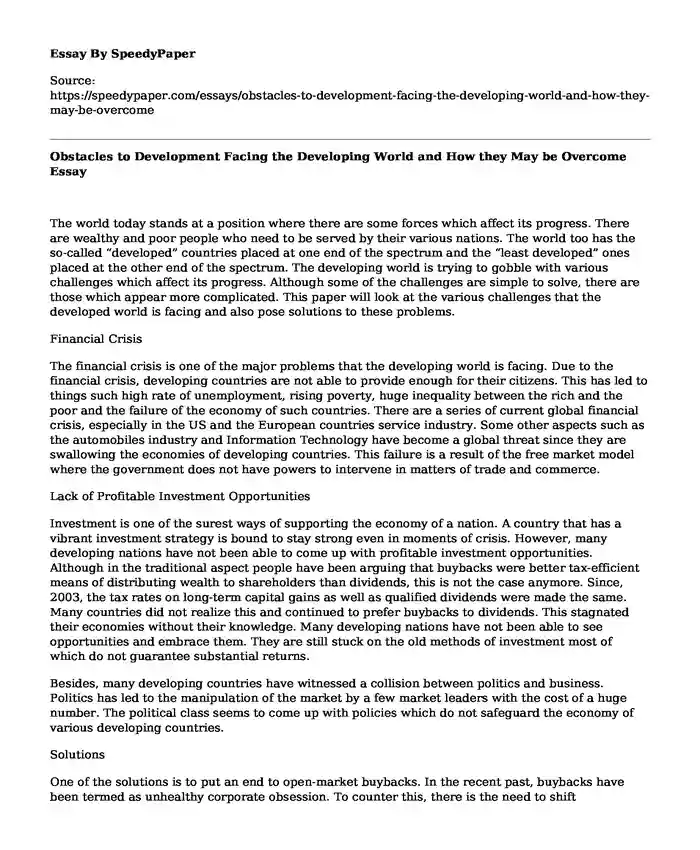
| Type of paper: | Essay |
| Categories: | United States Law Development |
| Pages: | 3 |
| Wordcount: | 791 words |
The world today stands at a position where there are some forces which affect its progress. There are wealthy and poor people who need to be served by their various nations. The world too has the so-called "developed" countries placed at one end of the spectrum and the "least developed" ones placed at the other end of the spectrum. The developing world is trying to gobble with various challenges which affect its progress. Although some of the challenges are simple to solve, there are those which appear more complicated. This paper will look at the various challenges that the developed world is facing and also pose solutions to these problems.
Financial Crisis
The financial crisis is one of the major problems that the developing world is facing. Due to the financial crisis, developing countries are not able to provide enough for their citizens. This has led to things such high rate of unemployment, rising poverty, huge inequality between the rich and the poor and the failure of the economy of such countries. There are a series of current global financial crisis, especially in the US and the European countries service industry. Some other aspects such as the automobiles industry and Information Technology have become a global threat since they are swallowing the economies of developing countries. This failure is a result of the free market model where the government does not have powers to intervene in matters of trade and commerce.
Lack of Profitable Investment Opportunities
Investment is one of the surest ways of supporting the economy of a nation. A country that has a vibrant investment strategy is bound to stay strong even in moments of crisis. However, many developing nations have not been able to come up with profitable investment opportunities. Although in the traditional aspect people have been arguing that buybacks were better tax-efficient means of distributing wealth to shareholders than dividends, this is not the case anymore. Since, 2003, the tax rates on long-term capital gains as well as qualified dividends were made the same. Many countries did not realize this and continued to prefer buybacks to dividends. This stagnated their economies without their knowledge. Many developing nations have not been able to see opportunities and embrace them. They are still stuck on the old methods of investment most of which do not guarantee substantial returns.
Besides, many developing countries have witnessed a collision between politics and business. Politics has led to the manipulation of the market by a few market leaders with the cost of a huge number. The political class seems to come up with policies which do not safeguard the economy of various developing countries.
Solutions
One of the solutions is to put an end to open-market buybacks. In the recent past, buybacks have been termed as unhealthy corporate obsession. To counter this, there is the need to shift corporations back to a retain-and-reinvest regime. Although this is not an easy thing, it is worth the effort. It is necessary for developing nations to rescind to the safe harbor. Developing nations must resist from the practice of tying executive compensation to stock price as this undermines the formation of human and physical capital.
The other way of resolving some of the challenges such as lack of profitable investment opportunities is by investing in ventures that decrease costs in investments. Some of the strategies that can be used to decrease costs include decreasing inventories, decreasing direct costs, and decreasing overheads. Developing nations must work out on reducing the inflation rates to ensure that the investments do not operate on a loss. Inflations rates have a high influence on investment. When there is high and variable inflation in the economy, the country tends to create confusion and uncertainty, coupled with uncertainties over the cost of investment. When inflation is high and volatile, there may be economic uncertainty as well as future downturn. To avoid this, nations need to ensure that inflation rates are kept as low as possible.
Conclusion
By and large, developing nations are faced with numerous challenges in their quest to improve their economies. The world is experiencing different economic, social, environmental and political times and nations must adapt to the changing times lest they are left in the abyss of low economic development. Some of the challenges that developing nations face are financial crisis, and lack of profitable investment opportunities. To be able to cope with the changing economic times, the developing nations must seek to solve these challenges. Some of the solutions are putting an end to open-market buybacks to solve the financial crisis. As regards the lack of profitable investment opportunities, developing nations should seek to invest in the less inflated areas and ensure that the economy is stable to be able to sustain the investments.
Cite this page
Obstacles to Development Facing the Developing World and How they May be Overcome. (2023, Jan 04). Retrieved from https://speedypaper.com/essays/obstacles-to-development-facing-the-developing-world-and-how-they-may-be-overcome
Request Removal
If you are the original author of this essay and no longer wish to have it published on the SpeedyPaper website, please click below to request its removal:
- Free Essay on the Story Young Goodman Brown
- Essay Example Describing Freshener Products
- Essay Example on Tenure and Promotion Effect on Faculty Work
- Marxism Today Essay Example for Everyone's Use
- Essay Example on Ecosystem and Restoration Ecology Effects
- Essay Sample on Policy Initiatives and Concepts to Support the Elderly
- Creating an Effective Curriculum for Infant Development - Essay Sample
Popular categories




